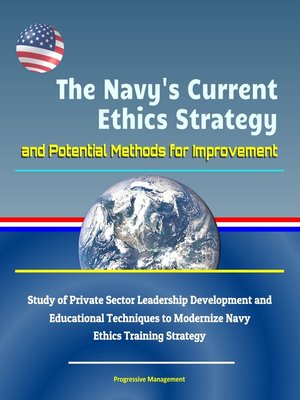The Navy's Current Ethics Strategy and Potential Methods for Improvement
ebook ∣ Study of Private Sector Leadership Development and Educational Techniques to Modernize Navy Ethics Training Strategy

Sign up to save your library
With an OverDrive account, you can save your favorite libraries for at-a-glance information about availability. Find out more about OverDrive accounts.
Find this title in Libby, the library reading app by OverDrive.



Search for a digital library with this title
Title found at these libraries:
| Loading... |
This important December 2017 report has been professionally converted for accurate flowing-text e-book format reproduction.
The U.S. Navy has been experiencing ongoing ethical issues within its officer ranks. The recent "Fat Leonard" and Marines United photo-sharing scandals, coupled with numerous other less-publicized unethical officer misconduct incidents and infractions, provide examples that, despite the Navy's core tenets of honor, courage, and commitment, problems persist. This thesis uses the private sector and other executive agencies as models by which the Department of the Navy can improve, develop, update, or modernize its ethics education and training strategy. The researchers analyze the Navy Leadership Development Framework as it pertains to ethics training, comparing current Navy strategies with best practices of leadership development and educational techniques in the private sector, other government departments, and military services. Strategy plays a significant role in shaping institutions to achieve desired outcomes and deliver value to their stakeholders; the researchers examine the Navy's strategy using program impact theory by reviewing observation data and publicly available source material. Related recommendations seek to improve the Navy ethics education strategy to further enhance its leaders' competency and character.
I. NAVY ETHICS UNDER SIEGE * A. BACKGROUND * B. PROBLEM STATEMENT * C. ASSUMPTIONS AND HYPOTHESIS * D. MAJOR RESEARCH QUESTIONS * E. RESEARCH DESIGN * II. CURRENT NAVY EDUCATION AND TRAINING STRATEGY * A. IMPORTANCE OF STRATEGY * B. A DESIGN FOR MAINTAINING MARITIME SUPERIORITY * C. NAVY LEADER DEVELOPMENT STRATEGY (NLDS) * D. NAVY LEADER DEVELOPMENT FRAMEWORK (NLDF) * E. NAVY EDUCATION TRAINING COMMAND (NETC) STRATEGY * III. PERFORMANCE OF ETHICS TRAINING AND EDUCATION * A. OFFICER TRAINING COMMAND (OTC) * 1. Officer Candidate School (OCS) * 2. Officer Development School (ODS) * 3. Limited Duty Officer/Chief Warrant Officer (LDO/CWO) Academy * 4. Navy Reserve Direct Commission Officer Indoctrination Course (DCOIC) * 5. Naval Sciences Institute (NSI) * B. U.S. NAVAL ACADEMY (USNA) * C. NAVAL RESERVE OFFICERS' TRAINING CORP (NROTC) PROGRAM * D. NAVAL POSTGRADUATE SCHOOL (NPS) * E. U.S. NAVAL WAR COLLEGE (NWC) * F. NAVY-WIDE TRAINING * G. TRACKING/MEASUREMENT TOOLS * IV. BEST PRACTICES IN ETHICAL EDUCATION AND TRAINING * A. CHARACTER BUILDING * 1. Role Models * 2. Storytelling * 3. Virtuous Behavior * 4. Leadership Passages * B. MORAL ACTION * 1. Moral Sensitivity * 2. Moral Judgement or Reasoning * 3. Moral Motivation * 4. Moral Execution * C. MEASURING PROGRESS: OUTCOMES OF ETHICAL LEADERSHIP * 1. Individual Outcomes * 2. Organizational Outcomes * V. CONCLUSION * A. COMPARISON AND CONTRAST OF BEST PRACTICES * B. PROGRAM IMPACT THEORY * C. ANSWERS TO MAJOR RESEARCH QUESTIONS * D. FUTURE STUDIES OR FOLLOW-UP * APPENDIX. SPECIFIC CHARGES FILED AGAINST OFFICERS AT GENERAL OR SPECIAL COURTS MARTIAL, JANUARY THROUGH AUGUST 2017






